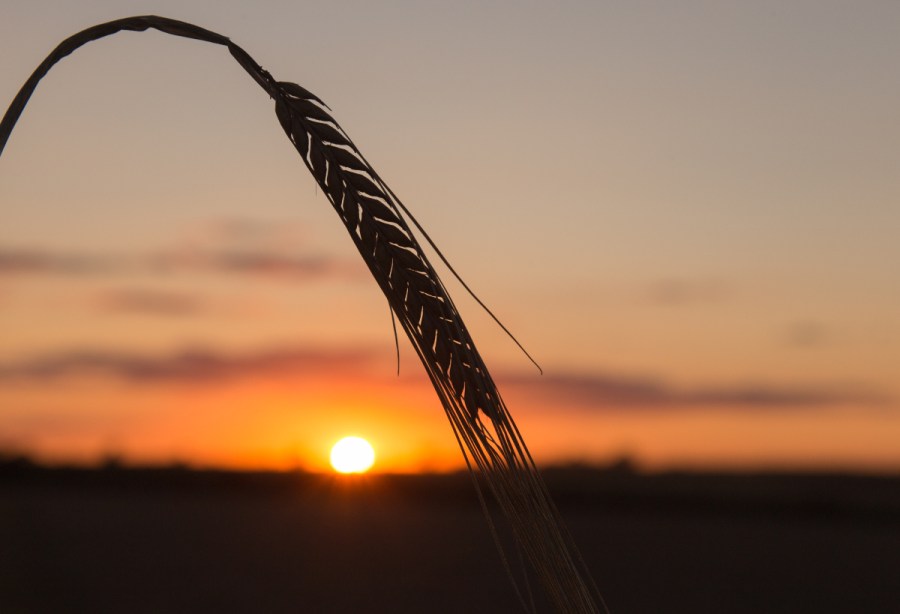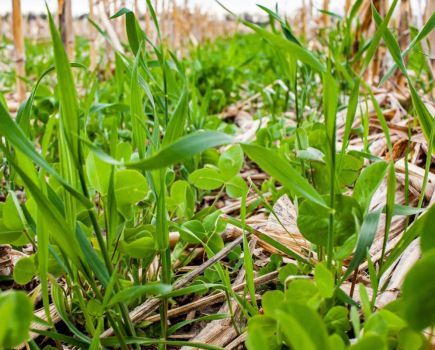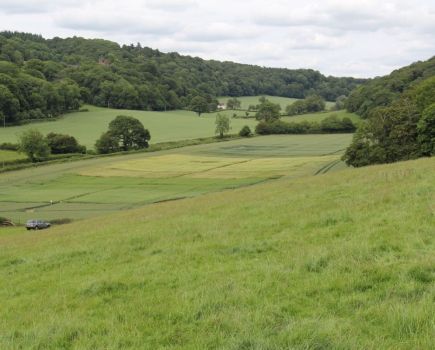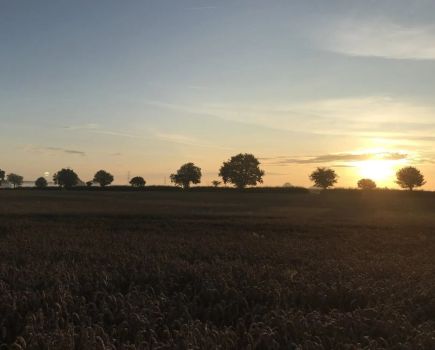As growers seek to ensure sustainability across the breadth of their businesses, variety choice could play a fundamental role. CPM finds out more.
Advanced crop genetics have a vital role to play in achieving the vision.
By Charlotte Cunningham
From fertiliser products to the machinery used to establish and harvest crops, many arable growers globally are in the midst of examining all areas of their businesses in a bid to ensure they remain as ‘sustainable’ as possible.
Sustainability has arguably become a bit of a buzzword in agriculture. However, delving further into the etymology of the word, to sustain effectively means to maintain. Putting this into practical terms, sustainability should be about putting measures in place to ensure that both the farm business and the surrounding environment are maintained for future generations.
That’s the view of Jim Monaghan, professor of crop science at Harper Adams University who says building a sustainable future involves addressing both short and long-term challenges. “Short-term, the industry is facing dramatic fluctuations in input costs and market margins. Long-term, net zero and climate change is clearly the big point of discussion and the key goal.
“But whether you’re focused on the short or long-term, the industry has got to change and I believe the extent of the change required is probably going to surprise many.”
So what does he believe has got to happen to meet these goals and to grow sustainable farm businesses of the future?
Soil is the starting point, believes Jim. “Minimum tillage is likely to become a big part of sustainability as the industry seeks to improve and create stable soil structures.
“Many in the arable sector are already doing this or moving towards this, but for those growing potatoes and root crops, getting to a place of minimal soil disturbance is something that I think will be a real challenge.
“In fact, I’m already hearing stories of those on rented ground being told they can’t grow potatoes as landowners are wanting to be able to sell carbon credits.”
Looking further at cropping, Jim reckons legumes will become a more pivotal part of arable rotations. “Options like field beans will be really important from a regen/soil conservation perspective due to their nitrogen fixing benefits.”
But the level of detail required to build sustainable farm businesses goes beyond just rotations, and Jim says individual varieties have a role to play. “Gone are the days of just thinking about production when it comes to variety choice – now growers have to consider both how they can optimise yield and crop performance as well as protect and nurture the environment. Specific traits are becoming more important and I think that’s going to continue. Characteristics like nitrogen-use efficiency are likely to be highly desirable as growers seek to achieve good protein levels, but with less N, for example.
“I think growers should also be looking at genetics from the view of wanting to reduce reliance on inputs for pest and disease control.
“Resilient varieties which can do well and thrive in changing times are going to be the future and varieties and breeding are going to be a big part of the sustainability solution.”
Continuing the conversation, KWS technical specialist Olivia Potter adds that a move to more sustainable agricultural practices often means growers have to reduce dependence on often costly crop inputs and intensive production methods to deliver a more balanced and environmentally-friendly future for crop management.
She echoes Jim’s sentiments and says that alongside some of the more obvious areas to target – like diesel and energy – seed choices have a fundamental role to play in helping UK agriculture achieve both its low carbon obligations and reducing the environmental impacts of farming in the future.
“Advanced crop genetics have a vital role to play in achieving this vision and this has been the ethos behind KWS’s ‘Sowing for Peak Performance’ (SPP) initiative which puts producing varieties that will help deliver greater future sustainability right at the heart of its future breeding strategy.”
But how exactly can this initiative help growers to deliver a more sustainable future? Olivia says there are five key areas of impact.
Maximising production and profitability from available resources
Helping growers get as much as possible from their own land and resources through varieties that have optimum field performance and yields, but that also have key functional traits to make them more resilient and offer added-value market opportunities, is a key future objective for KWS, she explains.
“For example, varieties from KWS’ portfolio of dynamic wheats already mean producers can maximise the market value of their production through optimising the balance between yield and quality to best target opportunities with the highest return.”
Varieties in this generation of wheats include KWS Extase – combining high yields with robust septoria protection – as well as KWS Zyatt, a Group 1 breadmaking wheat with UKP for export and consistently high second wheat performance, she explains.
Looking to the future, Olivia adds that KWS is also already working on varieties that are explicitly targeted at wide or specific drilling windows, with greater ability to use the nitrogen applied and that require simpler management requiring less man hours.
Achieving effective crop management with reduced windows of opportunity
Availability of varieties that perform consistently in adverse growing conditions and can express their full genetic potential in a variety of less than optimal circumstances are essential for future crop production success, reckons Olivia.
“Developing more ‘self-contained’ varieties that are more tolerant of a range of growing conditions and extreme weather events – and less dependent on time-critical interventions such as specific spray applications – is also key.
“Such varieties will not only buy extra time for growers facing adverse weather conditions, but they will also reduce the man hours spent tending crops.”
Achieving optimum crop health without a high level of agronomic interventions
Growing plants are likely to be under greater abiotic stress at key times in the future, and Olivia says the UK is likely to experience more of the conditions and micro-climates that encourage the development of yield-sapping diseases.
“KWS varieties that ensure genetics and chemistry work in partnership to the best effect are already established, but we plan to have many more in the future.
“Developing genetics that deliver the highest untreated yields and respond in an optimal manner to agronomic inputs when they’re needed is a key priority for us.”
Reducing the amount of all inputs used and associated costs
Stronger growing varieties with higher levels of vigour outcompete weeds more easily and reduce herbicide spend – plus stiffer straw means growers unlikely to be as reliant on PGRs and achieve easier, quicker harvesting, explains Olivia.
What’s more, varieties that are also more efficient at utilising nitrogen results in more nutrients being used for growth instead of being lost from the system, she adds.
“A really high output Group 4 variety like KWS Dawsum has strong yield potential built into its DNA so it is able to make optimum use of key nutrients. What’s more, its strong vigour and robust growth habit mean it’s most likely to maintain good plant health – even in difficult growing conditions.
“This is borne out by an untreated yield of 92% in the latest Recommended List data. The fact that it can deliver top performance in a variety of geographical locations, on different soil types and in early and late drilling slots, speaks volumes about its genetic strength.
“Such varieties will not only deliver obvious benefits to the environment, they’ll also transform production economics too. The less time spent applying agrochemicals and fertilisers in the future, the greater the savings on labour, diesel and machinery maintenance.
Getting greater productivity from soils long-term
As mentioned, the less inputs needed to grow crops, the less time growers will have to spend in the tractor cab, and Olivia adds that not only will this have financial advantages, but it will also benefit the soil.
“Less travel means less potential damage to soils and less time and money spent trying to correct the compaction problems associated with multiple wheelings and carrying out operations in unsuitable conditions.
“Earlier maturing and harvesting crops allows for better, less potentially injurious cultivations, with specific varieties optimised for zero and minimum tillage operations a real possibility in the not-so-distant future.”
Many of these developments are here now, allowing growers to successfully align their crop production objectives with their own sustainability goals, believes Olivia.
“But KWS’ ongoing commitment to its SPP initiative will ensure this grows even stronger in the years ahead.”
Farming for the future
With a focus on raising the farmers of the future, Harper Adams is now incorporating sustainability into teaching with the launch of its School of Sustainable Food and Farming – in partnership with Morrisons, McDonalds and the NFU.
Jim says this will bring topics like carbon sequestration and renewable energy to the forefront of priorities within its undergraduate teaching.
But what about the farmers of today? Philip Bradshaw is among those already taking significant steps to ensure the sustainability of his 220ha farming operation in the Cambridgeshire Fens. “If we’re not sustainable, we’re not profitable, and if we’re not profitable we can’t look after the land or grow quality produce from it,” says Philip. “Looking after natural capital and conserving soils is something we have to be thinking about and doing now, and I like to live by the old adage of ‘living like you’re going to die tomorrow and farming like you’re going to live forever’.”
In practical terms, Philip takes a no-till, conservation agriculture approach to producing his combinable crops. “Apart from occasional soil loosening, we haven’t tilled here for seven years – we’re drilling crops mainly with a low disturbance disc drill. This has brought our fuel usage down, which is great for profitability but has also helped us to reduce the farm’s greenhouse gas emissions.”
Variety choice is also important for Philip, with traits like strong disease resistance and nitrogen-use efficiency highly desirable in his system. “In no-till situations, varieties that get up and away and emerge quickly may be useful, so breeding has a pivotal role to play here.”
Breeding and building resilience is often something that’s talked about when trying to future-proof businesses, and for Philip, it’s multi-faceted. “As I said, profitability and sustainability go hand in hand, so yield is still incredibly important when it comes to variety choice.
“However, varieties that combine vigour with the ability to establish a good root system to aid nitrogen uptake, and can remain healthy without a heavy reliance on inputs are going be the ones that facilitate truly sustainable, resilient businesses.
“Arguably, on the Fens this may be slightly easier than in more challenging landscapes. But with our approach we can reduce our inputs and subsequently our costs, but what’s more, there’s actually the potential to increase our margins too.”
Looking at the wider picture, and how the industry can facilitate this on a larger scale, Philip believes there’s a want for more research. “As farmers, I think we have to know more about what can be done on a farm level to maintain output and margins while farming with the environment in mind.
“This is only going to be achieved with collaboration – effectively, the supply chains and the food production industry working together, and I believe greater management of supply chains is needed to enable that going forward.”
Fit for the Future
In this series of articles, CPM has teamed up for the fourth year with KWS to explore how crop markets may evolve, and profile growers set to deliver ongoing profitability.
The aim is to focus on the unique factors affecting variety performance, to optimise this and maximise return on investment. It highlights the value plant genetics can now play in variety selection as many factors are heavily influenced and even fixed by variety choice.
KWS is a leading breeder of cereals, oilseeds, sugar beet and maize. As a family-owned business, it is truly independent and entirely focused on promoting success through the continual improvement of varieties with higher yields, strong disease and pest resistance, and excellent grain quality. We’re committed to your future just as much as you are.




